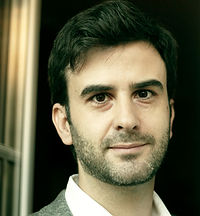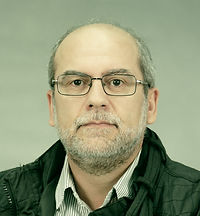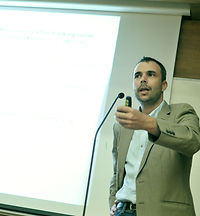

Renato Miguel do Carmo is a Researcher Fellow at Centre for Research and Studies in Sociology (CIES-IUL) and Assistant Professor at the University Institute of Lisbon (ISCTE-IUL). Graduated with a degree in Sociology from New University of Lisbon (UNL) in 1993 and obtained an MA in Sociology in 1997 (UNL), and a PhD in Sociology in 2006 from Institute of Social Sciences (ICS-UL).
His research revolves around social and spatial inequality, social capital, mobility, urban and rural studies, and public policies. Since obtaining the PhD, he has received three scientific awards: awarded with the ISCTE-IUL prizes for one of best international articles published in 2010; award to the best article in the field of regional studies published in Portuguese journals in 2008 (Portuguese Association for Regional Development, APDR); special Prize of the Jury 2009 for the best article published in the journal Análise Social by a young researcher.
José Maria Castro Caldas is a researcher at CES. Is a member of the of the research group on Science, Economy and Society, of the Observatory on Crisis and Alternatives and of the Risk Observatory. He was previously assistant professor at the Economics Department of ISCTE and researcher at DINÂMIA He graduated in Economics and concluded a Master in Mathematics Applied to Economics and Management at ISEG and a PhD in Economics at ISCTE.
His present main research interests include; personal and collective deliberation, institutional economics and the history of economics.
He authored "Economia(s)" (with Francisco Louçã, Afrontamento, 2009) and "Escolha e Instituições - Análise Económica e Simulação Multiagentes" (Celta, 2001) e articles published in Revue de la Regulation, Journal of Economic Issues, The Journal of Artificial Societies and Social Simulation, Economics of Innovation and New Technology, Revista Crítica de Ciência Sociais and Cambridge Journal of Economics.
Vítor Neves is Assistant Professor at the Faculty of Economics of the University of Coimbra. He is currently responsible for the courses of “Public Economics” (1st degree in Economics), “Economics of the Welfare State” (all 1st degree courses and ERASMUS students), “History of Economic Thought” (master in Economics) and “Seminar in the Methodology of Economics and Sociology” (PhD in Governance, Knowledge and Innovation) and collaborates in the “Seminar on Governance, Institutions and Public Policy” of the same doctoral program.
He got a PhD in economics from the University of Coimbra in 2003 and develops his research at the “Research Group on Science, Economy and Society” of the Centre for Social Studies of the University of Coimbra (CES). His work has been mainly focused on the study of the nature of economics as a science, with publications on the meaning of the 'economic'; open systems and interdisciplinarity; objectivity in economics; and social costs. Particular attention has been given in this domain to the works of Ronald Coase and K. W. Kapp (among others). He is now developing, with colleagues from Brazil and Italy, a research project on “Welfare systems, social cohesion, sustainability and growth”.
The growing importance of finance: a critical perspective
The problem of Social Costs
Inequalities: an overview
Inequalities and Crisis from Malthus to the IMF:
an overview of economic ideas
13/03/2015 | 16h00 | Room C301
6/03/2015 | 16h00 | Room C301
17/04/2015 | 16h00 | Room C301
8/05/2015| 16h00 | Room C301




Renato Carmo
José Castro Caldas
Vítor Neves
Ricardo Paes Mamede
Ricardo Paes Mamede has a PhD in Economics from Bocconi University (Italy) and a Master’s in Economics and Management of Science and Technology from ISEG/University of Lisbon. He is Assistant Professor of Political Economy at ISCTE – University Institute of Lisbon, where he teaches since 1999 in the fields of European Integration, Economics of Innovation, and Competitiveness and Innovation Policy. In 2007/2008 he headed of Department of Economic Analysis and Forecasting at the Portuguese Ministry of the Economy and Innovation. From 2008 to 2014 he coordinated the Research and Evaluation Department at the NSRF Observatory, the government agency responsible for monitoring the use of EU structural funds in Portugal.